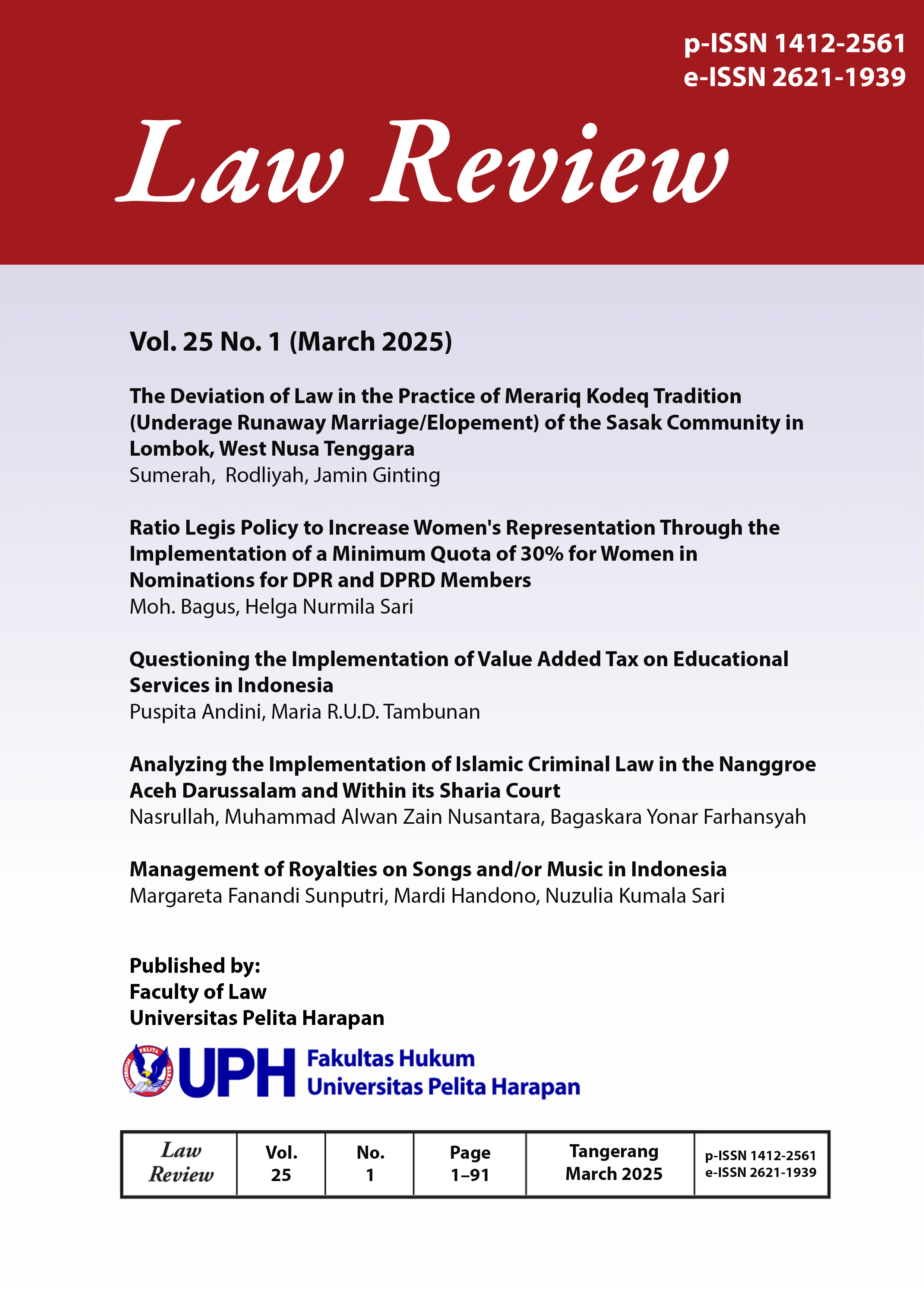Questioning the Implementation of Value Added Tax on Educational Services in Indonesia
DOI:
https://doi.org/10.19166/lr.v25i1.7519Λέξεις-κλειδιά:
Value Added Tax, Tax Policy, Educational ServicesΠερίληψη
Law Number 7 of 2021 on Tax Regulation Harmonization has ushered in notable alterations to the Value Added Tax (VAT) stipulations within Indonesia. Notably, this law now classifies educational services as taxable entities. This study examines the background of the VAT policy on education services and evaluates it. Adopting a post-positivist approach, the research utilizes literature studies and in-depth interviews for data collection. The research shows that such a shift in policy raises concerns about legal clarity and the methods for imposing VAT. Amid public disapproval, the authorities opted to subject educational services to VAT but with certain exemptions. Despite these tax breaks, education service providers still must issue tax invoices, potentially elevating their compliance costs. However, the tax authorities have yet to provide detailed guidance on how this law affects educational service providers in terms of subjects, objects, and VAT bases. Based on the conducted research, the advised steps forward include specifying which educational services are impacted, ensuring clear communication about the legal aspects of educational services, and facilitating administrative procedures for taxpayers to meet their responsibility.
Αναφορές
Laws and Regulations
Republic of Indonesia Law Number. 8 of 1983 on the Value Added Tax of Goods and Services and Tax on Luxury Goods Sale.
Republic of Indonesia Law Number 11 of 1994 on the Amendment of Law Number 8 of 1983 on the Value Added Tax of Goods and Services and Tax on Luxury Goods Sale.
Republic of Indonesia Law Number 18 of 2000 on the Second Amendment of Law No. 8 of 1983 on the Value Added Tax of Goods and Services and Tax on Luxury Goods Sale.
Republic of Indonesia Law Number 42 of 2009 on the Third Amendment of Law No. 8 of 1983 on the Value Added Tax of Goods and Services and Tax on Luxury Goods Sale.
Republic of Indonesia Law Number 7 of 2021 on Harmonization of Taxation Regulation.
Republic of Indonesia Government Regulation Number 50 of 1994 on the Amendment to the Decree of the Minister of Finance Number 291/KMK.05 of 1997 on Bonded Zones as Already Amended Several Times, the Latest by the Decree of the Minister of Finance Number 349/KMK.01/1999.
Republic of Indonesia Government Regulation Number 50 of 1994 on Amandment to the Decree of the Minister of Finance Number 291/KMK.05 of 1997 on Bonded Zones as Already Amanded Several Times the Latest by the Decree of the Minister of Finance No. 349/KMK.01/1999
Republic of Indonesia Government Regulation Number 144 of 2000 on the Types of Goods and Services Not Subject to Value Added Tax.
Republic of Indonesia Government Regulation Number 49 of 2022 on Exemption from Value Added Tax and Value Added Tax or Luxury Goods Sales Tax Not Collected on Import and/or Delivery of Certain Taxable Goods and/or Delivery of Certain Taxable Services and/or Utilization of Certain Taxable Services from Outside the Customs Area.
Republic of Indonesia Minister of Finance Regulation Number 223 of 2014 on Criteria for Educational Services Not Subject to Value Added Tax.
Books
Nurmantu, S. Pengantar Perpajakan. Jakarta: Granit, 2005.
Schenk, Alan, and Oliver Oldman. Value Added Tax: A Comparative Approach in Theory and Practice. Cambridge: Cambridge University Press, 2022. https://doi.org/10.1163/9789004502192.
Schenk, Alan, and Oliver Oldman. Value Added Tax: A Comparative Approach in Theory and Practice. Cambridge: Cambridge University Press, 2022. https://doi.org/10.1163/9789004502192.
Thuronyi, Victor. Tax Law Design and Drafting. Washington, DC: International Monetary Fund, 1996. https://doi.org/10.5089/9781557755872.071.
Journal Articles
Andreana, P., and Inayati. “Principles of Tax Collection in Value Added Tax (VAT) on Digital Services in Indonesia.” Jurnal Public Policy 8, no. 1 (2022). https://doi.org/10.35308/jpp.v8i1.4692.
Rosdiana, H. “Evaluating State Levies for Higher Education.” Bisnis & Birokrasi: Jurnal Ilmu Administrasi dan Organisasi 18, no. 2 (2012): 166–176.
Lola Inganta Saragih, Padhilah Dikri, Kuat Sidik Wahyono, and Suparna Wijaya, “Pajak Pertambangan Nilai terhadap Jasa Pendidikan: Upaya Mendukung Pemerataan Pendidikan.” Jurnal Pajak Indonesia 6, no. 26 (2022): 674–680.
Smith, Stephen, and Alan A. Tait. “Value Added Tax: International Practice and Problems.” The Economic Journal 100, no. 399 (1990): 339–356. https://doi.org/10.2307/2233622.
Sulfan. “Kinerja PPN di Indonesia Tahun 2011–2020.” Jurnal Pajak Indonesia 5, no. 2 (2021): 206–216. https://www.jurnal.pknstan.ac.id/index.php/JPI.
Tanzi, Vito, and Hamid R. Davoodi. “Corruption, Growth and Public Finance.” SSRN Electronic Journal (2021). https://doi.org/10.2139/ssrn.880260.
Website Contents
DDTC. “Fasilitas PPN Jasa Pendidikan Pascaterbitnya UU HPP dan Persoalannya.” DDTC News, 2022. https://news.ddtc.co.id/fasilitas-ppn-jasa-pendidikan-pascaterbitnya-uu-hpp-dan-persoalannya-37475.
Kementerian Keuangan Republik Indonesia. “Kenaikan Tarif PPN dalam Kerangka Reformasi Perpajakan.” Media Keuangan Kemenkeu, 2022. https://mediakeuangan.kemenkeu.go.id/article/show/kenaikan-tarif-ppn-dalam-kerangka-reformasi-perpajakan.
Λήψεις
Δημοσιευμένα
Πώς να δημιουργήσετε Αναφορές
Τεύχος
Ενότητα
Άδεια
Πνευματική ιδιοκτησία (c) 2025 Puspita Andini, Maria R.U.D. Tambunan

Αυτή η εργασία είναι αδειοδοτημένη υπό το CC Αναφορά Δημιουργού – Μη Εμπορική Χρήση 4.0.
Authors who publish with this journal agree to the following terms:
1) Authors retain copyright and grant the journal right of first publication with the work simultaneously licensed under a Creative Commons Attribution License (CC-BY-SA 4.0) that allows others to share the work with an acknowledgement of the work's authorship and initial publication in this journal.
2) Authors are able to enter into separate, additional contractual arrangements for the non-exclusive distribution of the journal's published version of the work (e.g., post it to an institutional repository or publish it in a book), with an acknowledgement of its initial publication in this journal.
3) Authors are permitted and encouraged to post their work online (e.g., in institutional repositories or on their website). The final published PDF should be used and bibliographic details that credit the publication in this journal should be included.





